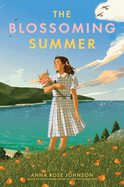
Anna Rose Johnson's gentle, approachable middle-grade historical novel The Blossoming Summer explores the consequences of one teen believing her family's stability and happiness depends on her alone. When she learns that part of her father's "American" identity includes French Canadian Ojibwe, she adds to her emotional burden by trying to incorporate everything about her newly discovered identity into her British one.
It's 1940, and 13-year-old Rosemary's dream of an idyllic home seems impossible as the Second World War nears the U.K. and "her parents and brothers [are] scattered across England." When her family evacuates to the United States to live with the grandmother she's never met, Rosemary is certain she will be "the ideal older sister" and perfect daughter in a family that hasn't lived together for three years. But nothing can "perfectly" prepare her to handle a real, complicated world. After Rosemary's father begrudgingly tells his children about his cultural background, Rosemary works to bond with her intimidating grandmother by helping cultivate prize-winning produce; she also begins learning words, skills, and customs in her newly discovered culture, wanting to "understand about being Ojibwe" the same way she understands "all about being British."
Johnson (The Luminous Life of Lucy Landry), who is a member of the Sault Ste. Marie Tribe of Chippewa Indians, maintains a strong connection to her heritage in her writing, a straightforward style reminiscent of Natalie Babbitt's Tuck Everlasting and Jeanne Birdsall's Penderwicks series. Timeless themes of prejudice, identity, honesty, and letting go of control make this quiet, tender novel easy to relate to in any decade. A glossary of Anishinaabemowin (Ojibwe language) words is included. --Emilie Coulter, freelance writer and editor

